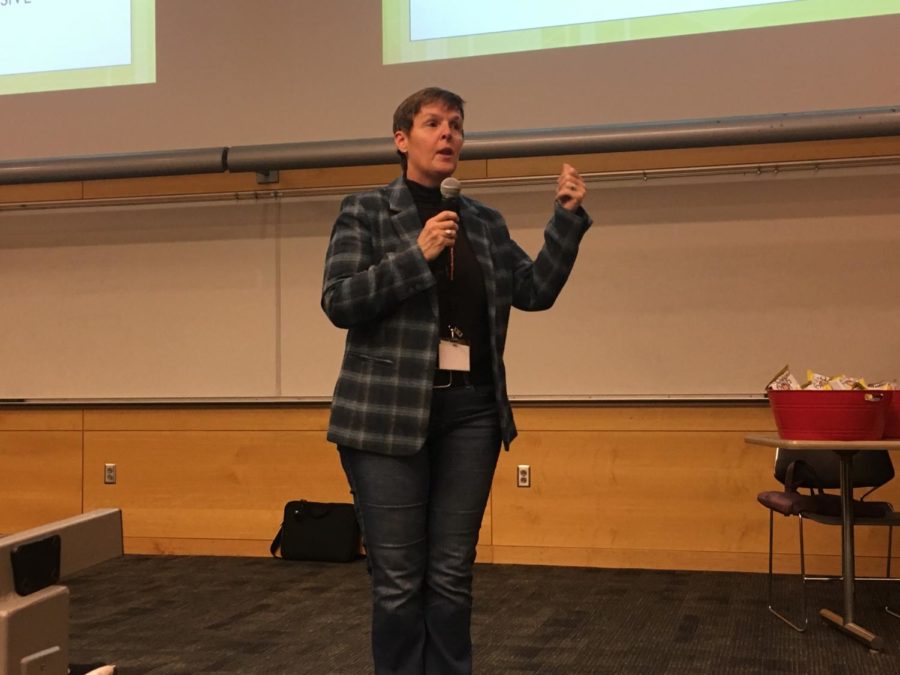Human Trafficking: ‘A buyer driven market’
Caitlin Yamada/Iowa State Daily
Ruth Buckles, from Youth and Shelter Services and a Teens Against Human Trafficking Coordinator, spoke about the signs of human trafficking and how prominent is is in the United States and in Iowa.
October 11, 2018
Human trafficking is defined as forced labor or services, or “commercial sexual activity through the use of force, fraud or coercion.”
Within the law, unless a person is under the age of 18, force, fraud and coercion have to be proven for a human trafficking case.
Ruth Buckles, from Youth and Shelter Services and a Teens Against Human Trafficking Coordinator, Allison Bell, an Iowa State Police officer, and Alissa Stoehr, a lecturer in the women and gender studies and sociology department, presented three different sides of human trafficking Thursday in 1210 LeBaron Auditorium.
Buckles is a 30-year foster parent and has 19 adopted children and four natural born children.
Buckles advocates against human trafficking because of her desire to change the world and help people. When she attended college at Iowa State, she was interested in foster care and called it her “call to action.”
Trafficking is a business model and anyone can traffic, Buckles said. These traffickers are people who have found it is a business they enjoy doing and is profitable.
“They like the power, they like the authority, they like to hurt people,” Buckles said. “Power over people is the name of the game in human trafficking.”
On average nationally, traffickers make $32,000 a week, Buckles said.
Buckles outlined three different types of trafficking: pimp controlled trafficking, gang trafficking and family trafficking.
Pimp controlled trafficking has someone at the top, the pimp and a second level of “middle managers,” which can range from one to 30 people. The middle managers have been trafficked and have “learned the business from the inside.”
“They could be anybody on your campus,” Buckles said. “The youngest trafficker I have worked with is 12 … he was pimping out the kids in his mom’s daycare. The oldest trafficker I have had acquaintances with is in his upper 70s low 80s, and he’s a generational trafficker.”
Generational meaning his grandparents did it, his parents did it and his children are going to do it, Buckles said.
Everyone has a weakness which mean everyone can be trafficked, Buckles said.
“How many of you have somebody you love?” Buckles asked. Buckles continued to say this is a weakness and traffickers take advantage of it.
Reasons people fall victim and do not self report is because of a fear of not being believed, threats against family and friends, involvement with illegal activities, fear of retaliation and loss of stability and trauma, said Bell in her presentation.
One of the largest misconceptions surrounding human trafficking is that the individuals are missing people.
Buckles used Mollie Tibbetts disappearance as an example.
“Did you see how the Iowans came forward and said ‘not on our watch, everybody’s looking,’” Buckles said. “It was all over. That’s what happens when it is a missing person. Traffickers do not want to be exposed that way. They want to stay in plain sight, undercover.”
Instead, traffickers use coercion techniques instead, such as taking control of a person’s debit cards, blackmailing or taking forms of identity.
“I am slowly but surely chipping away at your ability to get away from me,” Buckles said. “Pretty soon [as a trafficker] I’m networking in, I’m sleezing my way right into your world to the point where I can say ‘you can’t do it without me. I own you.’”
Bell gave examples of real trafficking cases in Iowa. In Waterloo, a male met girls online and convinced them they would have a better life with him. He supplied them with necessities and trafficked them. In Des Moines, a father allowed his drug dealer to commit sexual acts with his children in exchange for crack cocaine.
The largest piece of advice the presenters gave is to call the police and report suspicious behavior, even if it may be nothing.
The national hotline is 1-888-373-7888 and operates 24/7 in over 200 languages. The Iowa hotline is 1-800-770-1650 and also operates 24/7.
Buckles said to be aware of the information you are giving away, such as fears, schedules, family ties or anything that could be used by traffickers against you.
The presenters also said to be aware of the places you are attending and to never leave a friend behind, because they could become victims of human trafficking.
Stoehr concluded by giving the audience advice on what to do with the information they received. This included calling the hotlines when someone sees something suspicious, keeping oneself informed and attending more lectures on human trafficking, telling 10 friends about what they learned and donating to organizations that help trafficking victims and help inform the public.
















